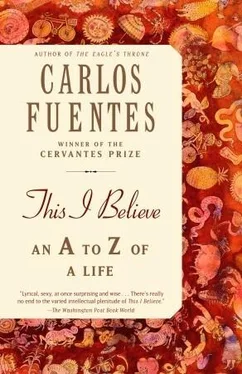“Well then, we should listen to the voices that speak on God’s behalf. .”
“For example?”
“St. John of the Cross, once again. ‘Vivo sin vivir en mí / y de tal manera espero / que muero porque no muero.’ (I live yet do not live in me / and wait as my life goes by / and die because I do not die.)”
“Lovely but funereal. Something a bit more lively, perhaps.”
“Simone Weil. ‘God did not create anything except love itself, and the means to love.’ As such, Weil reasons, God exists because my love is no illusion. This is why Simone Weil feels in control of her free judgment to believe in God. Her acceptance or rejection of God depends on her freedom.”
“Pascal goes further than that, when he places these words in the mouth of God: ‘Thou wouldst not seek Me, if thou hadst not found Me.’ ”
“But he follows that with a warning that is almost a commandment: ‘Console toi.’ Console yourself. And I rebel against the notion of consolation.”
“Didn’t you say you believed in rebellious faith, inconsolable faith?”
“The glory of God is that of human creation. Let us accept this on the condition that this creation neither punishes nor rewards us. It simply identifies us.”
“Admit it, we live in a wounded world.”
“Only the action of humans will be able to close the world’s open wounds one day.”
“What you mean then, is that creation is unfinished.”
“Yes. And this is the fissure through which God inevitably finds His way into the world. If God created us in His image and likeness, does God contain human evil? I answer yes. We are also the reflection of the bad or incomplete side of God. We strive to make God ‘complete.’ ”
“We strive to make God complete. You know, I feel that you approach faith from the perspective that not believing in God— given that we strive to complete God — diminishes our own possibilities as humans. That not believing in God would be closing off our own horizons as humans. Is it cowardice not to believe in God?”
“Take as an example that God is both object and subject at the same time. His condition as a living being is subjective. But objectively speaking, for you and for me, He is — and can only be — the mirror of the soul. The work, then, of humans.”
“Don’t you believe in eternal life?”
“If it exists, when we arrive there we will receive a new agenda that will be unknown until that very moment. We don’t know the agenda of Heaven.”
“New instructions?”
“That’s right. If there is such a thing as eternal life, let us leave the details up to God.”
“Today we cremate dead bodies. How can we attest to the resurrection of the flesh that proclaims the credo?”
“Think, my friend, of the equivalence of the body rather than its resurrection. Think of the renewal of the soul rather than of survival.”
“In conclusion, do you believe in God?”
“In conclusion, does God believe in me?”
“Listen, I think I will stick with Pascal’s wager. I believe in God, because if God exists, I come out winning, and if He doesn’t exist, I don’t lose a thing.”
Happiness, felicidad, bonheur, felicitá. Few words inspire, so universally, such conceptual abundance and at the same time such ambiguity. Happiness has never been absent from Western thought. Eudaemonism to the ancients, the notion in the Latin distinguishes between happiness as external fortune on the one hand and internal fact on the other. For Socrates, happiness is an interior phenomenon that is identified with virtue. Aristotle, as one might expect, transforms happiness into an external action that operates according to reason. For hedonists, happiness is pleasure and pleasure is happiness. The Epicureans are more specific: we take pleasure in external life, but if we want to be happy let us not succumb to its charms. Democritus identifies happiness with serenity ( ataraxia ) and serenity with stability and the expulsion of desire, fear, and physical pain.
The English utilitarians (Hobbes, Bentham, Mill) give happiness its more modern, straightforward, and, arguably, dogmatic meaning. What is useful is good. However, we generally (and erroneously, I believe) consider the French Revolution to be responsible for the consecration of the brand of happiness that has prevailed from the eighteenth century onward in the West and all its peripheral societies. The founding laws of the United States of America declare this as its citizens’ right — if not the right to happiness itself, then its less presumptuous equivalent, the pursuit of happiness. This enlightened right rapidly fused with a kind of Puritanism that rendered happiness the great aspiration of the United States, but also turned the nation into the Manichaean bearer of happiness as good versus evil. In our own times, we have witnessed the supreme example of this concept: the United States as the self-proclaimed axis of good (and thus the axis of happiness) pitted against the axis of evil (and thus the source of all misery). One side defines itself through the good-happy synonymy and all nonadherents to this belief are relegated to the evil-unhappy synonymy.
The current situation on the international stage illustrates yet again — as if the horrors of the twentieth century did not suffice — the ambiguity of happiness. One need look no further than the films of Leni Riefenstahl or the newsreels of Soviet congresses and public rallies to see a vision of “happiness” amidst a sea of smiling, sun-kissed faces. Andrei Blinov, hack writer of Socialist realism (also known as Zhdanovism), published a novel entitled Happiness Cannot Be Sought Alone. What he meant, of course, is that happiness requires the cooperation of the faithful, disciplined multitudes who are unable to conceive of happiness of their own accord, without the direction of Party and Chief.
But it is true that individual happiness must be incorporated into the social sphere, whether you call that phenomenon solidarity, or even pity. The philosophers of the Enlightenment had a profound understanding of the significance of this dimension of happiness. The great Spanish historian Carmen Iglesias addresses the issue directly in her book Razón y sentimiento en el siglo XVIII ( Reason and Emotion in the 18th Century ). With Montesquieu in mind, Iglesias poses the following question: How can we reconcile individual freedom with “social happiness”—without which individual happiness is incomprehensible, at least in the eighteenth century? Montesquieu would no doubt invoke “an institutional articulation that protects the freedom of the individual and reconciles it with a certain prosperity of the State, as a guarantee of the material well-being of the citizens or social happiness.”
Condorcet is the thinker who examines Montesquieu’s balancing act between personal and social happiness and transforms it into myth — a dangerous myth on all counts, for it is one that unites happiness and progress, and regards progress to be something inevitable, fatal, and ascendant. We are condemned to achieve progress and the degree to which we achieve it will determine our degree of happiness. And so Condorcet tells us we had better be happy, whether we like it or not, because the laws of progress are ascendant and inexorable. It was Nietzsche who had to remind us, with his characteristic critical pessimism, that happiness and history rarely coincide. Rousseau, to whom Amado Nervo could have dedicated the verse he dedicated to Kempis—“Jean-Jacques, what evil for me you have wrought / with that book you wrote”—proposes a social contract, let us not forget, that is based upon a pessimistic vision of the disintegration of the modern world, which renders each and every individual an unhappy being. But then, were we ever happy? In the state of nature, the philosopher tells us, happiness is as fleeting as a bolt of lightning. Beyond his perspectives as a philosopher-politician, however, Rousseau is also, without a doubt, the father of Romanticism and the exaltation of happiness in the erotic realm, the pleasure of the senses, the recklessness of a Byron, the suicide of a Werther. .
Читать дальше












